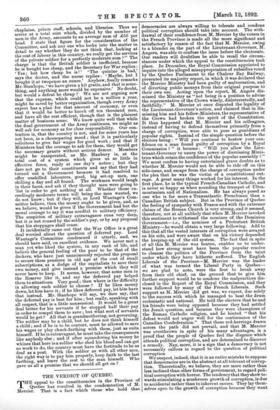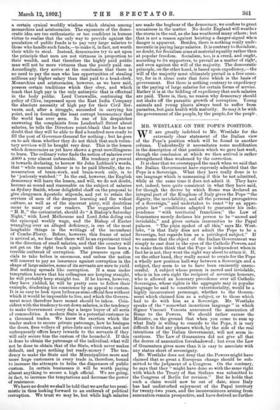chaplains, prison staff, schools, and libraries. Thus we democracies are
always willing to tolerate and condone arrive at a total sum which, divided by the number of political corruption should take into account. The with- Government—i.e., the nominee of a Protestant British tion. Theoretically, we believe, they are more rather than less inclined than other forms of government, to regard poli- a certain cynical worldly wisdom which obtains among monarchies and aristocracies. The exponents of the demo- cratic idea are too enthusiastic or too confident in human virtue to realise that the only way to provide against the peculation of public funds is to pay very large salaries to those who handle such funds,—to make it, in fact, not worth their while to steal. Instead, democracies try to act upon the principle that men are not virtuous in proportion to their wealth, and that therefore the highly paid public man will WA be more virtuous than the poorly paid one. Accordingly, they arrive at the conclusion that there is no need to pay the man who has opportunities of stealing millions any higher salary than that paid to a head-clerk. Monarchies and aristocracies, however, as we have said, possess certain traditions which they obey, and which teach that high pay is the only antiseptic that is effectual in the body politic. Lord Cornwallis, continuing the policy of Clive, impressed upon the East India Company the absolute necessity of high pay for their Civil Ser- vants, and, after a struggle, succeeded in carrying his point, and in founding the least corrupt bureaucracy that the world has ever seen. In one of his despatches answering the complaints from Leadenhall Street about salaries, he tells the Directors point-blank that he has no doubt that they will be able to find a hundred men ready to fill the post of Governor-General for nothing ; but he goes on to ask them whether they do not think that such volun- tary services will be bought very dear. This is the lesson which democracies as yet have shown a great unwillingness to learn. The ordinary voter finds the notion of salaries over £400 a year almost unbearable. His tendency at present is towards declaring, to borrow Sir John Lubbock's words, that "while manual labour is to be paid liberally, the re- muneration of brain-work, and brain-work only, is to be 'jealously watched.'" In the end, however, the English democracy will learn the lesson, and will, we do not doubt, become as sound and reasonable on the subject of salaries as Sydney Smith, whose delightful chaff on the proposal to give clergymen Apostolic stipends, and yet to retain the services of men of the deepest learning and the widest culture, as well as of the sincerest piety, will doubtless occur to many of our readers. The suggestion that "H. B.." the caricaturist, should do "A Bishop's Saturday Night," with Lord Melbourne and Lord John doling out the episcopal weekly wage, and the Bishop of Exeter wrangling over an alleged deficiency, is one of the most laughable things in the writings of the incumbent of Combe-Florey. Before, however, this frame of mind is arrived at, we fear that there will be an experiment tried in the direction of small salaries, and that the country will not get on the right track again until there has been a terrible outbreak of corruption. The pressure upon offi- cials to take bribes is enormous, and unless the nation will consent to pay an insurance against corruption in the shape of large salaries, some of its servants are sure to yield. But nothing spreads like corruption. If a man under temptation knows that his colleagues are keeping straight, he will probably keep straight too. If he knows, however, they have yielded, he will be pretty sure to follow their example, deadening his conscience by an appeal to custom. It is so easy to look upon bribes as semi-official fees without which it would be impossible to live, and which the Govern- ment must therefore have meant should be taken. Coin- cident with the tendency to cut down salaries, is the tendency to make Government every day a larger buyer of all sorts of commodities. A modern State is a potential customer in a thousand trades. We know the exertion which the trader makes to secure private patronage, how he besieges the doors, fires volleys of price-lists and circulars, and not unfrequently offers heavy rewards to the servants if they will only secure him the custom of the household. If this is done to obtain the patronage of the individual, what will not be done to obtain that of the State, which never makes default, and pays nothing but ready-money ? The ten- dency to make the State and the Municipalities more and more huge customers in every trade is, therefore, bound to increase the attempts to bribe the dispensers of public custom. In certain businesses it will be worth paying almost anything to secure a high official. We are going, in fact, to increase the temptations and decrease the power of resistance. We bade no doubt we shall be told that we are far too pessi- mistic in thus looking forward to an outbreak of political corruption. We trust we may be, but while high salaries are made the bugbear of the democracy, we confess to great uneasiness in the matter. No doubt England will weather the storm in the end, as she has weathered many others ; but that is not a reason against hoisting a, danger-signal when danger is apparent. Besides, there is nothing really unde- mocratic in paying large salaries. It is contrary to Socialism, no doubt, for Socialism aims at material equality rather than at popular freedom. Socialism, too, is a creed, and ought, according to its supporters, to prevail as a matter of right, and even against the will of the majority. The democratic principle, on the other hand, is based upon expediency,—the will of the majority must ultimately prevail in a free coun- try, for in it alone rests that force which is the basis of government. But there is nothing contrary to expediency in the paying of large salaries for certain forms of service. Rather it is at the bidding of expediency that such salaries are paid. There is, then, no reason why democracy should not shake off the parasitic growth of corruption. Young animals and young plants always tend to suffer from parasites, but gain health with maturity. So may it be with the government of the people, by the people, for the people.



































 Previous page
Previous page